Discussion of AI agents; What is the ideal relationship between humans and AI?
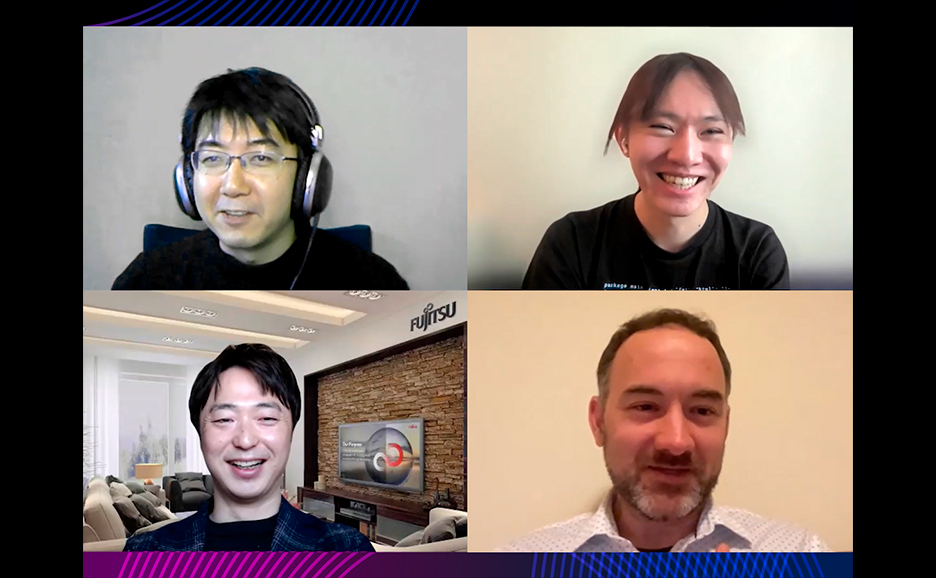
Article|2025-2-3
In December 2024, Fujitsu held a special online discussion entitled "AI creates; AI evolves. The future of society transformed by AI agents."
The discussion panel included Mr. Takahiro Anno, an AI engineer; Dr. Graham Neubig, an associate professor at Carnegie Mellon University and a leading researcher on AI agents; and Dr. Genta Suzuki of the Artificial Intelligence Laboratory at Fujitsu Limited. The discussion was moderated by Mr. Shinta Nakayama (Tokoroten), representative of NextInt Inc. Topics covered included questions such as: What is an AI agent? What kind of future will we create? What kind of society will it be? And what role will humans play in the future? All of these and more were discussed. This article covers the key highlights of the conversation.
What is an AI Agent and how different is it from Generative AI?
Suzuki : While generative AI "generates content," an AI agent "acts to accomplish a specific task or goal."
Planning and executing detailed tasks to achieve goals is a key characteristic of AI agents. In response to an abstract task instructed by a human, they think about what to do, select the most appropriate route, and carry out "planning" and "action." Actions can include chat responses, digital operations (such as website access and app operations), and physical operations (such as robot control and driving).
For example, when asked "Where should I go this weekend?" the AI agent analyzes your preferences and suggests you go to a restaurant, as well as visits the restaurant's website to make a reservation on your behalf.
For example, let’s take the AI agents announced by Fujitsu. Fujitsu has three types of AI agents: conference AI agents [1], video analysis AI agents [2], and multi-AI agent security technology [3].
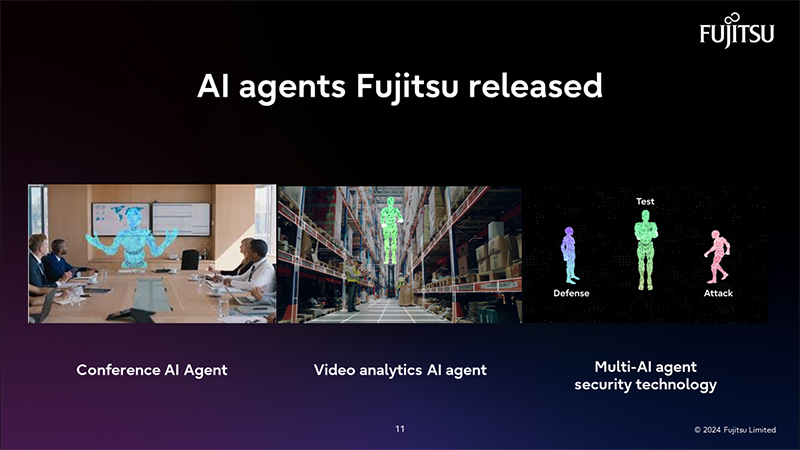
A conference AI agent sits in an online meeting and visualizes data on a topic. For example, if you're talking about sales, an AI agent will create a graph of related sales on the fly. Even if you don't give specific instructions, it will read the context of the conversation and display the necessary data.
The second type of agent is the "Video Analysis Type Field Work Support Agent," which supports on-site work by recognizing images. For example, the AI will analyze footage of a forklift truck an employee is working on, to see if there's any danger and warn them.
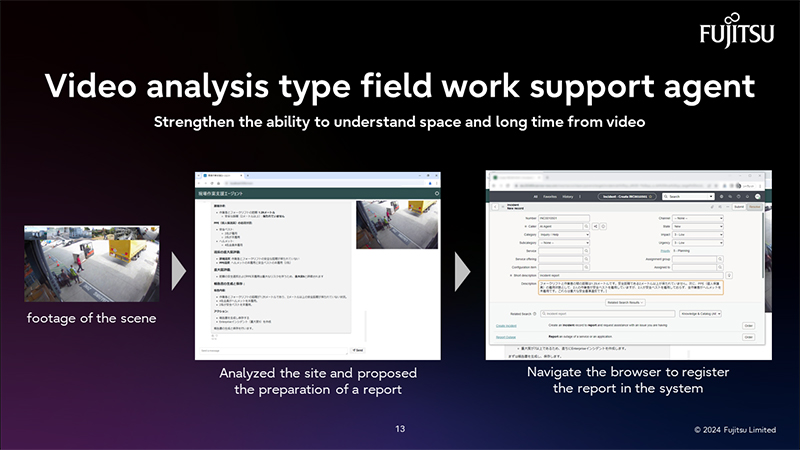
The third type of agent is the multi-AI agent security technology, in which multiple AI agents work together to conduct analysis to enhance security.
Nakayama : Thank you very much.
Next, I would like to ask Professor Neubig to talk about the latest AI agents.
Neubig : An agent is an AI that performs a task but requires a combination of a language model (GPT-4, Claude, Gemini, etc.) and tools. Tools include clicking on the screen, typing text, and recognizing images. More and more agents generate programs these days. Programs enable repetitive tasks, continuous monitoring, and more.
To operate a website, information about the website such as a manual is required in advance. It's also important to have the ability to predict the outcome of an operation and decide what to do next. Agents that combine images and text are also being studied.
No more AI experts?
Nakayama : Thank you very much.
Moving on, answer with a yes or no to the question, "Will AI experts no longer be needed?"
Anno : I'd say no, and I think we will continue to need AI experts. AI's accuracy is still not perfect, and humans need to prepare the data, select models, and monitor AI's work to solve tasks. While the definition of an AI expert may evolve in the future, especially as experts in specific fields need to understand AI better, the need for AI expertise will remain. As AI becomes 100% accurate in any task, this phase may change, but I think we will continue to need AI experts for the foreseeable future.
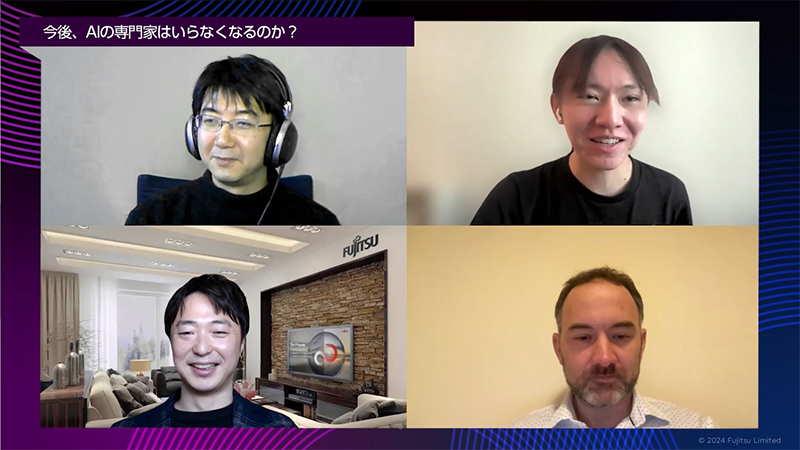
Suzuki : I would also answer no. As Mr. Anno said, there will be changes depending on the phase of AI evolution, but there is still much work to be done, particularly in the field of image recognition. The image shows a very complicated real world, and how to recognize and remember it. The real world is incredibly complex, and recognizing and remembering the details poses significant challenges. When it comes to memory, there are many challenges to be solved, such as how to efficiently store data and how to share it across multiple agents. Additionally, optimizing computing resources is also important. I believe AI researchers will remain relevant, even though the specific tasks may evolve depending on the phase of AI development.
Neubig : No. In fact, I believe AI will be used in all software from now on, so I think we all have to become AI experts. Especially for programmers, the way they write software will change, and they will be able to delegate complex tasks to AI. However, they will still need to understand the operating principles of AI, and I think the demand for AI developers will continue to grow. I expect this demand to increase for the foreseeable future.
Will AI take away creative jobs?
Nakayama : We would like to hear your opinion on the next topic "Will AI take away creative work?"
Suzuki : I’d answer ‘No’ to this as well. There's no single correct approach to creative work, and even if AI selects the “best” path for creative work, it may not necessarily be the right one. It is thus important that AI and humans collaborate to create better outcomes. Therefore, I believe that people and AI will increasingly work together on creative projects.
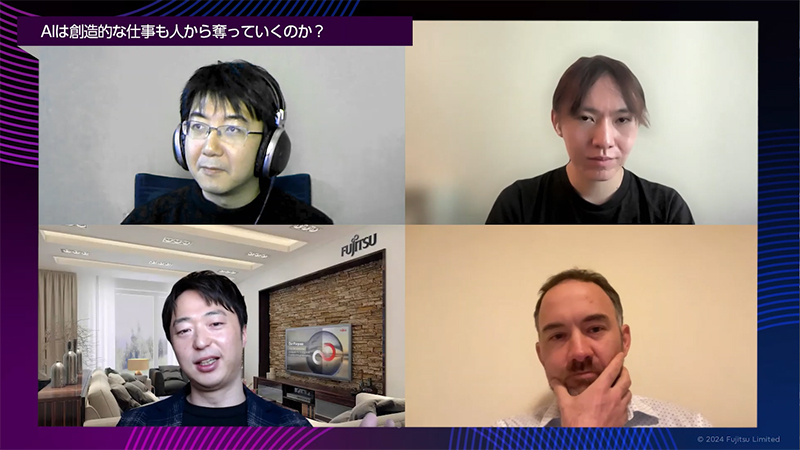
Nakayama : On the other hand, depending on the type of work, AI could have an impact. Creative jobs are not going away, but in the past, young people have had the opportunity to receive paid training that would allow them to be creative in the future. If these training jobs are replaced by AI, there will be fewer opportunities to acquire skills.
Anno : I believe this is already happening. In the translation industry, the situation differs between translators whose names are publicly recognized and those who are not. Named translators are using AI to increase their workload, while unnamed translators are facing lower unit costs due to AI. The problem is further complicated by the fact that, even within the same profession, there can be 180 degrees of difference in benefits depending on one’s position.
Neubig : The survival of creative work depends on the balance between supply and demand. Jobs with high demand will survive, but those without will face challenges. I used to work on machine translation. At that time, the unit price was lower, but as the work became technically easier, the number of translators increased, and the demand increased.
Anno : I think the real question is, what is creative work anyway? Making a good move in shogi used to be considered a very creative thought, but now algorithms can play it quite well. So, I think there are a lot of things that are currently considered "creative" that can be done algorithmically. There's basically nothing a human brain can do that a silicon brain cannot. Whether humans value it, is another matter entirely. Even if humans and AI create the same thing, I believe the value of things created by humans and things involving humans will persist.
What is the ideal relationship with AI?
Nakayama : Thank you very much.
Now, I would like to ask your opinion on the last topic, the ideal relationship between humans and AI.
Anno : I think there are three types of relationships between humans and AI. The first is the relationship between a tool and the person who handles it, the second is the relationship between God and the person who follows Him, and the third is a relationship of equality, that is, a relationship between equal partners. People view each of these three things differently. The ideal is a partnership, and I believe a relationship like Doraemon and Nobita, where both respect each other, is a good example.
Suzuki : I believe it will be highly important to understand each other. AI agents will be personalized and will work together to help individuals grow. In other words, I think the relationship between people and AI will evolve into a structure that revolves around you and helps you grow. Humans need to better understand AI's decisions and take responsibility for them, because when they accept AI's suggestions and they don't work, it's ultimately the humans’ responsibility. Mutual understanding is important.
Neubig : What Mr. Anno refers to as a "partner" is already happening. Some people find healing by talking to chatbots or treat them as lovers. I didn't fully understand this way of dealing with AI in the past. But the AI that I once used just as a tool has gotten smarter, and I’ve learned to engage with it a little better - I now speak politely to bots using phrases like “Please”. It may be a somewhat optimistic view, but the ideal relationship with AI is one where it can be used to help solve problems that humans have struggled with for years, such as treating difficult diseases or addressing issues like global warming. If we can accelerate the rate of scientific development by about tenfold, we will be able to tackle major challenges such as global warming, and we will continue our research toward that end.
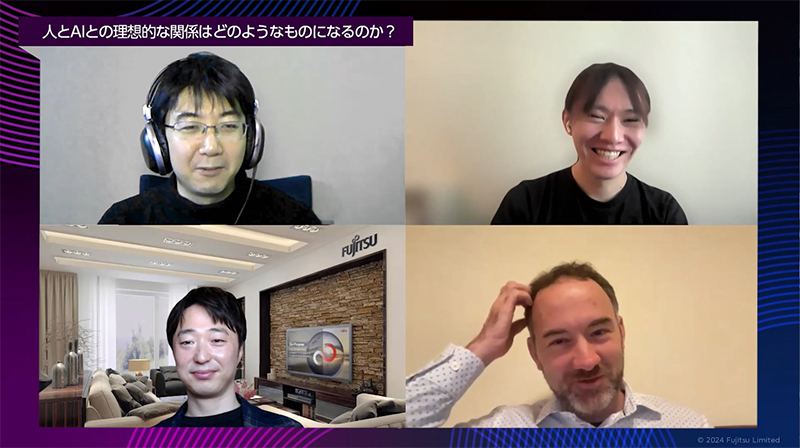
Conclusion
The development of AI is remarkable, and the emergence of AI agents is likely to change the way we interact with AI. As mentioned in the conversation, if humans and AI become good partners, we will be able to address various issues and move closer to a better future.
In February 2024, Fujitsu launched a new AI strategy message: "AI is becoming our trusted assistant." We believe that AI will become a trusted colleague enhancing human productivity and creativity.
Furthermore, in July 2024, under the slogan "Beyond Chat" we announced our plans to develop use cases for generative AI to solve business challenges beyond traditional reporting and chat applications.
As a partner supporting customer growth, Fujitsu will continue to focus on the development of cutting-edge technologies centered around AI.
Other Information
- Fujitsu Technology Strategy Briefing
- Fujitsu Research Portal: An exciting new environment where we offer users the opportunity to try out Fujitsu's advanced technologies rapidly and free of charge.
- Fujitsu Kozuchi: Fujitsu Kozuchi is a set of secure, reliable, cloud-based AI services that enhance the productivity and creativity of your business operations.
